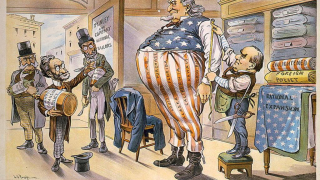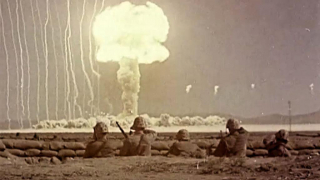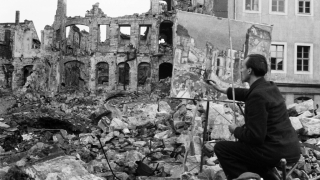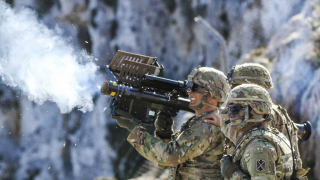THUCYDIDES ON WAR: TO BE STUDIED BY THE MOST ABLE OF MILITARY THEORISTS
16.01.2018
To be able to wage modern warfare cannot be merely defeating the enemy through a series of military engagements as being witnessed in the early twenty-first century, for the so-called vanquished enemy will often times return, as we have seen in the infested battle regions of Iraq and Syria. Without the understanding that the most pragmatic and final assault on any enemy in combat, on the battle field, can only be achieved through a scientific military theory based both on a strategic objective and studied analysis of when to wage war, there can be no lasting success to the end of a political crisis which was only abated but not ended by the means of war. Then there will be no end to such conflict but only lulls and a general repeat of an unsatisfied stand-off of no peace and no war. But to strike against an enemy in the first place, allowing for no way out for the enemy to survive under any circumstance, is the heart of the matter in the first place, and in studying the various small battles and large battles in the work the History of the Peloponnesian War by the ancient Greek historian, Thucydides, we come to grips with all the various nuances that make up the character of warfare.
What is lacking in the various theaters of conflicts in these modern times is a balance between a fluid scientific analysis of how and when to enter into a conflict or war situation, and how to understand and engage the spatial art of war or conflict conception of such an endeavor which must cause human suffering in which the various actors, their armies and citizens realize why they must fight and die in such a human conflict when it arises.
What we have instead in our time, are the various protagonists such as the United States with its imperialist hegemonic desires, not yet abated even as the country is in its decline with its Fascist regime kept alive by millions of submissive Americans ignorant of their own proto-Fascistic behavior.
Then on the other side, we have the emerging Russian state coming out of the great Soviet era, with its own desire to again regain its world influence upon those countries arising from a colonial past, these countries not only in the Middle- Eastern region, but also in regions of Africa stretching from the Democratic Republic of Congo to Yemen down to South America in such places as Venezuela, Ecuador and the former Soviet ally, Cuba. However, what both the United States and Russia lack is the understanding where the center of gravity is in pursuing the defeat of an enemy - one must not only assess the military strengths and weakness of the enemy, but also objectively analyze the culture and spiritual qualities or lack of regarding the overall political will of the people at the central core of the conflict.
Instead, both the United States and the Russians regimes make their great mistake in that in their ceaseless propaganda war and intermediate cyber-space conflict, including their various proxy wars, in their attempt to manipulate wars of liberation. They offer no alternative revolutionary theory, no modern release for a liberation of political, spiritual and culture way of life that the common man, the ordinary citizen craves for and would be willing to die for in a just cause.
As Thucydides posited, “History is Philosophy teaching by example,” one could also enlarge upon that singular statement and say a country which claims to have the means to better the situation of a people in all ways of living and dying, must set an example through leadership mirroring political ethics which teach or exemplify how to live without exploiting the people during a period of egregious economic suffering, and thus maintaining a quality of life that although not rich in material gain, is rich in human creative endeavors, even if those endeavors are limited within the human condition.
What we are faced with is an emerging Fascist regime in the United States which the American people willingly or unwilling cloak with a ‘Democratic’ spirit, while in Russia, they have an oligarchy pulled towards a need to become a so-called superpower on the world’s stage, while its people long to re-establish a Soviet way of life. Thus, we have two opposing political forces locked in a deadly struggle in which the citizens of both countries, including the peoples allied with the two countries, are part of the human tragedy playing out day by day within the borders and outside the borders of the United States and Russia.
With this view in mind of the polarization of these two belligerent systems of political and economic powers that hold sway over much of the world, it is imperative for the ablest of modern military theorists not only re-study the account of the Peloponnesian War by Thucydides, but also study in very careful detail the various tactical battles which the great Greek historian recounts.
The psychology and methodology of how both opposing forces of Athens and Sparta went after each other is instructive even in modern times, to better understand how an enemy might seek out in either an impulsive behavior or a calculated behavior to destroy an enemy position, or to politically intimidate an enemy at the first hint of weakness.
In our time, I recommend astute generals and heads of state peruse Thucidides' visionary “Melian Dialogue” pertaining to the surrender terms offered by the invading Athenian force to the military officers and citizens of Melos during the fighting of the Peloponnesian war, which the Melians rejected for what they believed was a Casus belli or as the French would say “une guerre juste” ending in the butchery and enslavement of the citizens of Melos, something we even see today among ISIS (known also as Daesh) terrorists, as well as among the American armed forces with their proxy Saudi Arab ally killing thousands of Yemenis peoples occurring in the country of Yemen.
Clearly, slaughter is now manifested as a way of life not only in the Middle East, but among the cartel fights in Mexico with thousands of innocent Mexican citizens killed outright, as well in the deepest regions of Colombia and Brazil where the poor, working class and indigenous peoples are protesting their right not be used as slave labor nor their land defiled in the most horrendous ecological destruction. All these examples, the modern military theorist must take into account if he or she is to justify interest and ability to instruct others how to wage war scientifically and efficiently, beyond merely waging war for profit and nihilistic slaughter. It is through studying the written history of Thucydides that the art of war achieves its most coveted accomplishment - waging war to limit the excesses of war.
When Thucydides asserted “Wars spring from unseen and generally insignificant causes, the first outbreak being often but an explosion of anger,” he was proclaiming to those who would listen - and those who would listen being the few even to this day - that war even among the most sophisticated and shrewd, whether they be government leaders, diplomats or the most aware intellectuals, are not cognizant that war ignited in ancient times, and wars coming seemingly spontaneously out of economic and political repression in modern times, are the result of a particular “explosion of anger” - that anger being in the people’s desire to have a healthy and sane life, even if that life is short lived, and for this reason alone, that anger is infused in all of us, to our dying days.














